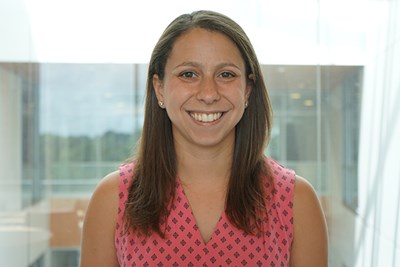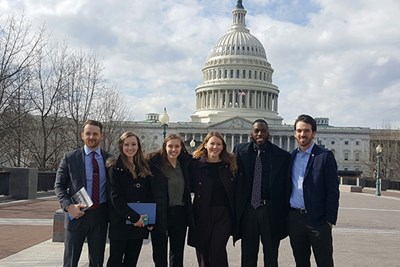UMass Lowell Online Master’s Ranked in Top 20 Nationally
 Image by Amber Breitenberg
Image by Amber Breitenberg
08/22/2018
By Katharine Webster
Sydney Rebello earned her undergraduate degree in criminal justice on campus – and immediately started a job with the U.S. Marshals Service, thanks to her for-credit internship with the federal agency during her final semester.
“I’d signed an offer before I even walked across the stage for graduation,” she says.
A year after joining the Prisoner Operations Division at USMS headquarters in Arlington, Va., Rebello went back to school to earn her master’s degree.
This time, she’s studying online. It’s a different experience, but she says the transition was seamless because she continued her studies through UMass Lowell’s bachelor’s-to-master’s program.
“They just make this really attainable and accessible,” she says. “And my classes give me a wide scope of knowledge that helps me in the day to day.”
Rebello’s experience is typical for students studying online in UML’s School of Criminology and Justice Studies, which is highly competitive in the U.S. News & World Report rankings, thanks to excellent faculty and versatile online, on-campus and combined degree pathways for undergraduates and master’s degree students. A new, on-campus Ph.D. program in criminology is also boosting the school’s reputation.
UML’s online master of criminal justice degree program tied for the No. 14 spot, while the university ranks No. 22 nationally for its online bachelor’s degrees, including the B.S. in Criminal Justice. The new Ph.D. program was ranked nationally at No. 27. And BestColleges.com rated the school’s online master of security studies program fifth in the country.
Rebello and other students say that’s largely due to the faculty, which includes experienced researchers, inspiring young professors and working professionals. The last group includes the Middlesex County sheriff and a psychologist who oversaw mental health services in Connecticut prisons. They teach both on campus and online.
“Those teachers have had the biggest impact on me because they have real-world experience: They were able to take what we learned in the books and apply it in their field,” Rebello says.
Sean Perry, who just completed a master’s degree through a combination of online and on-campus coursework, says two classes with Ron Corbett, who served as both executive director of the Massachusetts Supreme Judicial Court and as the state’s interim probation commissioner, were excellent because Corbett has a wide professional network to call upon.
“After we’d read a book or an article, we’d have a conference call with the authors,” Perry says. “Judges for drug courts would come in so we could pick their brains.”
Perry was equally inspired by the research faculty, including, he says, Emerita Professor Eve Buzawa, a nationally recognized expert on domestic violence. A young faculty member, Asst. Prof. Kimberly Kras, made the required course in descriptive and inferential statistics exciting and relevant, adds Perry, who plans to apply to the Ph.D. program.
 Image by K. Webster
Image by K. Webster
The master’s program coordinator, Assoc. Prof. Wilson R. Palacios, says that’s because most students are working professionals in law enforcement, corrections, social work or victim services.
“The classes are high level, very focused and tailored to what they really need to know to understand the changing nature of their jobs,” Palacios says.
Master’s students can choose to earn a four-course certificate in a specialty – domestic violence prevention, forensic criminology, victim studies or security studies – as part of their criminal justice master’s degree. Or they can customize their degrees, picking and choosing from a wide range of electives.
The School of Criminology and Justice Studies also offers the master of security studies degree in five different specialties: critical infrastructure protection, cyber security, homeland defense, international security and industrial and economic security.
Jennifer Kawaguchi, who is working toward a master’s degree in security studies with a concentration in homeland defense, came to UMass Lowell from San Ramon, Calif., as an undergraduate. She was attracted by the reputation of the university’s Center for Terrorism and Security Studies, a research center that focuses on evolving security threats and counterterrorism. She ended up getting three internships there.
Kawaguchi was also attracted by the bachelor’s-to-master’s option. As an undergraduate in the Honors College, she double majored in political science and criminal justice. She also completed two criminal justice graduate courses that counted toward both her bachelor’s and master’s degrees, saving time and money.
Like Rebello, Kawaguchi interned with the U.S. Marshals Service as an undergraduate through the university’s partnership with The Washington Center for Internships and Academic Seminars. She is now seeking full-time work with the Department of Justice or in emergency preparedness and management – and she says her graduate classes are great preparation for a career.
But the best part of the program, she says, is all the support and opportunities available to students.
“The professors all want you to succeed, whether you’re asking for career advice or about the material you’re learning.”




